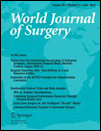Limitations of ACS-NSQIP in Reporting Complications for Patients Undergoing Pancreatectomy: Underscoring the Need for a Pancreas-Specific Module
This work was described in a quick-shot presentation at the 54th annual meeting of the Society for Surgery of the Alimentary Tract. It was also given as a long oral presentation at the 47th annual meeting of the Pancreas Club, Orlando, FL, May 2013.
Abstract
Background
Large centralized databases are used with increasing frequency for reporting hospital-specific and nationwide trends and outcomes after various surgical procedures in order to improve quality of surgical care. American College of Surgeons National Surgical Quality Improvement Program (ACS-NSQIP) is a risk-adjusted, case-weighted complication tracking initiative that reports 30-day outcomes from more than 400 academic and community institutions in the US. However, the accuracy of event reporting specific to pancreatic surgery has never been examined in depth.
Methods
We retrospectively reviewed medical records of patients, the information on whose postoperative course was originally reported through ACS-NSQIP between 2006 and 2010. Preoperative characteristics, operative data, and postoperative events were recorded after review of electronic medical records including physician and nursing notes, operative room records and anesthesiologist reports. Fidelity of reported clinical events was assessed. Accuracy, sensitivity, and specificity were calculated for each variable of interest.
Results
Two hundred and forty-nine pancreatectomies were reviewed, including 145 (58.2 %) Whipple procedures, 19 (7.6 %) total pancreatectomies, 65 (26.1 %) distal pancreatectomies, and 15 (6.0 %) central or partial resections. Median age was 65.7, males comprised 41.5 % of the group, and 74.3 % of patients were Caucasian. The overall rate of complications reported by NSQIP was 44.0 %, compared with 45.0 % in our review, however discordance was observed in 27.3 % of the time, including 34 cases of reporting a complication where there was not one, and 34 cases of missed complication. The most frequently reported event was postoperative bleeding requiring transfusion, however this was also the event most commonly misclassified. Additionally, three procedures unrelated to the index operation were recorded as reoperation events. While a pancreas-specific module does not yet exist, ACS-NSQIP reports a 7.6 % rate of organ-space surgical site infections; when compared with our institutional rate of Grades B and C postoperative fistula (10.4 %), we observed discordance 4.4 % of the time. Delayed gastric emptying, a common post-pancreatectomy morbidity, was not captured at all. Additionally, there were significant inaccuracies in reporting urinary tract infections, postoperative pneumonia, wound complications, and postoperative sepsis, with discordance rates of 4.4, 3.2, 3.6, and 6.8 %, respectively.
Conclusions
ACS-NSQIP data are an important and valuable tool for evaluating quality of surgical care, however pancreatectomy-specific postoperative events are often misclassified, underscoring the need for a hepatopancreatobiliary-specific module to better capture key outcomes in this complex and unique patient population.




